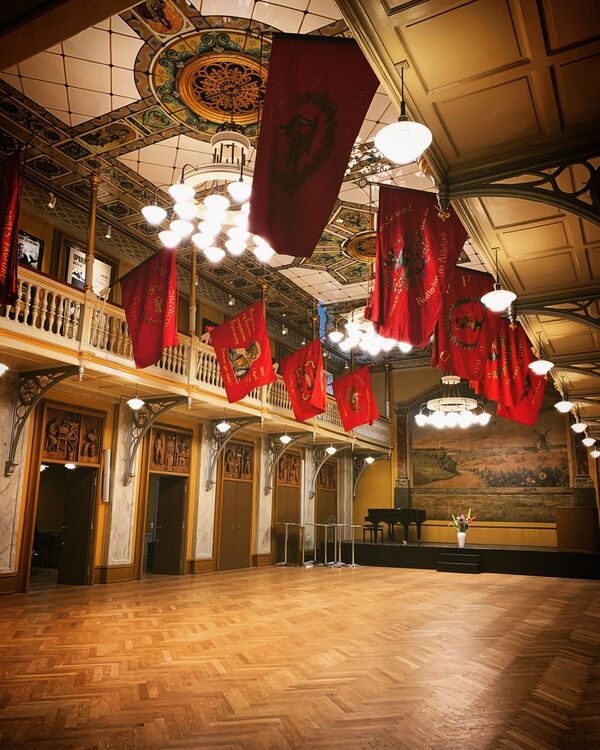Funded through the University of Strasbourg excellence programme (iDex), la Bibliothèque nationale et universitaire de Strasbourg, le GIS SCIRTHES et the Danish ministry.
To attend, it is necessary to register here.
In recent years, the Nordic welfare states have been celebrated around the world in surveys of social trust and happiness. In fact, according to the political economist Francis Fukuyama and many others, other states should learn from Nordic nations how to build democratic and egalitarian societies. However, what exactly should be learned? In order to identify the central elements, the success of the Nordic welfare states has so far mainly been studied from sociological and economic perspectives as a product of the Nordic welfare states itself. Yet it has proved difficult for other countries to adopt Nordic social institutions and, in this way, to generate greater social trust. It seems, that these institutions have a longer, more complicated history that should, as we suggest, even be understood in terms of cultural and religious history. On the other hand, the historically and culturally focused research on the Welfare state has typically followed a narrative of secularization of society, identifying the Nordic Social Democratic parties as its main agents, even if for example in a Danish context, the importance of the work and initiatives of N. F. S Grundtvig has been discussed, but seldom as part of Christian endeavors and so far mainly restricted to this specific type of Protestantism (Thorkildsen 1997). It seems, though, that cultural research has been religion blind all too long (Hammar 2000). Some of the most significant actors of the “Scandinavian Sonderweg” have been Pietist and Pietist inspired pastors and Lay-Christians (Witoszek 2011) and frequently the innovative visions of improved orders and modern welfare have also been produced in but also through integration processes with other religious traditions, e.g. Catholicism and the Jewish tradition.
In the frame of our research project on the Aesthetics of Protestantism in Northern Europe (Basel, Freiburg, Strasbourg), we organize an international conference that shall investigate the role of the intricate history and heritage of Protestantism as articulated in the multiple revival movements, state Protestantism, cultural Protestantism, spiritualism and atheism as part of history of present-day Nordic conceptions of welfare and happiness. We want to look on it from the perspective of cultural, literary, political and other branches of the study of cultural history and focus thereby focusing on the Aesthetics of Nordic Welfare state as integrating forms.
In consequence, we are particularly interested in papers that study mutual negotiations of profane and sacral, protestant and secular ideas, practices and aesthetics, taking cultural products as its research objects that seek to bridge or camouflage tensions and interactions between religious and secular aesthetics and ethics. In this context, Henrik Pontoppidan’s Lykke-Per (1898-1904/05),
Ellen Key’s Barnets Århundrade (1900), Aksel Sandemose’s En flyktning krysser sitt spor (1933) can be cited as works that, in spite of palpable interest in religious and ideological diversity, are governed by Protestant traditions of multiple kind, traditions that they transform into their visions of what constitutes collective and individual welfare and happiness in the modern world.
November 25th, 2021
Streaming https://www.youtube.com/watch?v=weq4JvNggis
9h30-10h15 Introduction
1015h-11h00 Frederik Stjernfeldt (Aalborg) : Danish protestantism in the Press Freedom Period 1770-73
11h00-11h45 Bernd Roling (FU Berlin) : Bucolics, public welfare and agricultural progress: Models of an ideal economical past in 18th century Sweden
12h-14h Pause-midi
14h-14h45 Arne Bugge Amundsen (Oslo) : Trust and Mistrust - Lutheran Pastors at the Wake of the Scandinavian Welfare State
14h45-15h30 Karl Clemens Kübler (Basel) : „I to kan utrette store ting sammen“ - The narrative reintegration of Protestantism into labor movement discourse in two novels by Johan Falkberget
15h30-16h Pause-café
16h-16h45 Nils Gunder Hansen (Syddansk Universitet Odense) : Henrik Pontoppidan – The Prodigal Son
16h45-17h30 Søren Blak Hjortshøj (Strasbourg) : Henrik Pontoppidan's Det Forjættede Land and the nordic anti-authoritarian Civil Sphere
November 26th, 2021
Streaming https://www.youtube.com/watch?v=D-lQEFV5lD8
9h-9h45 Vigdis Berland Øystese (Bergen): The role of hymns in the shaping of a new church and a new state
9h45-10h30 Piero Colla (Paris, Strasbourg): From Common Prayer to Morgonsamling: Protestant Mystique in Welfare State Schooling?
10h30-11h Pause-café
11h-11h45 Thomas Mohnike (Strasbourg) : Work and Salvation. Selma Lagerlöf and Protestant Ethics of Welfare
11h45-12h30 Frederike Felcht (Frankfurt): A Communion of Swedes? On Protestantism in Vilhelm Moberg’s Emigrants-series (1949–1959)
12h30 Lunch break
14h00 Maria Hansson (Paris-Sorbonne) : The Fantastic in the Nordic Welfare State. Secularisation and Rationalisation in Let the Right One In by John Ajvide Lindqvist
14h45 Pehr Englén (Strasbourg): 'Det hemliga sällskapet': conspiracy as mode of (re-)enchantment in the Swedish literature of the 1980s
15h30 Final discussion
